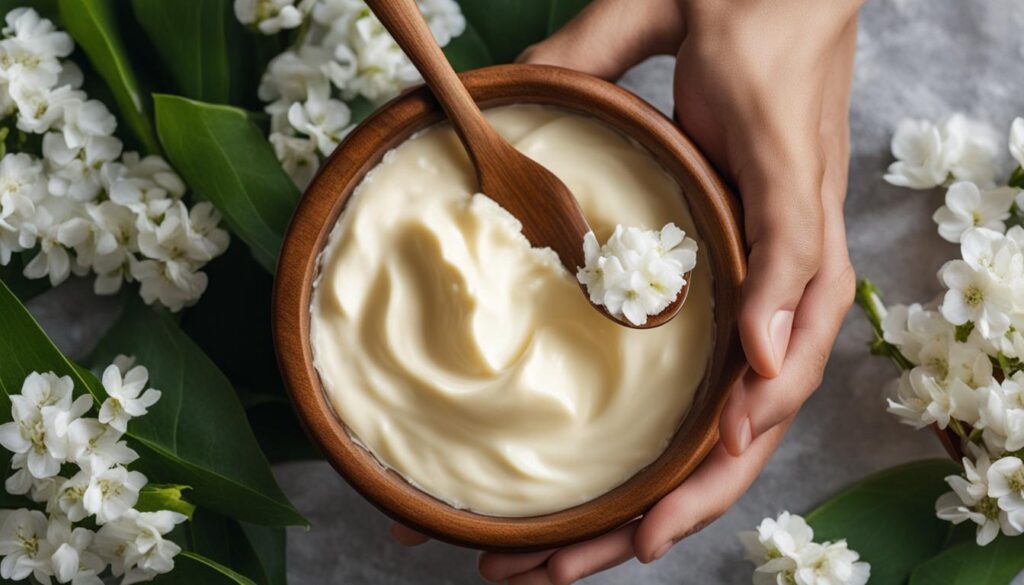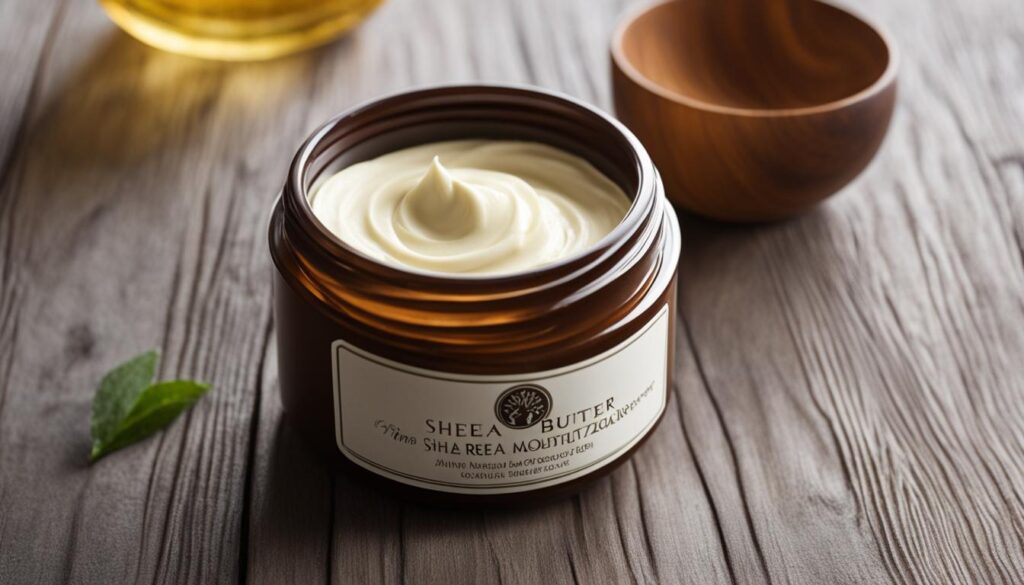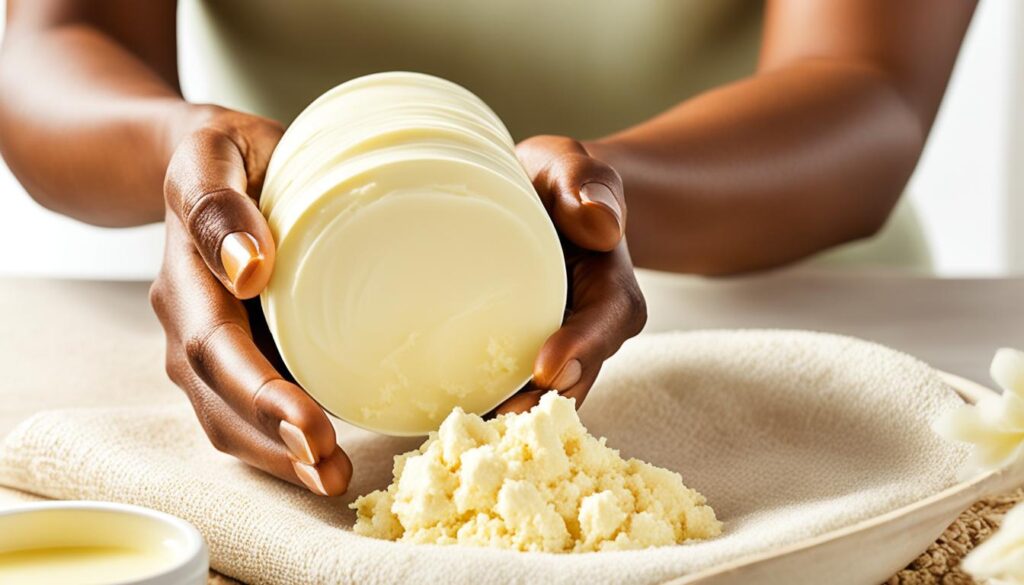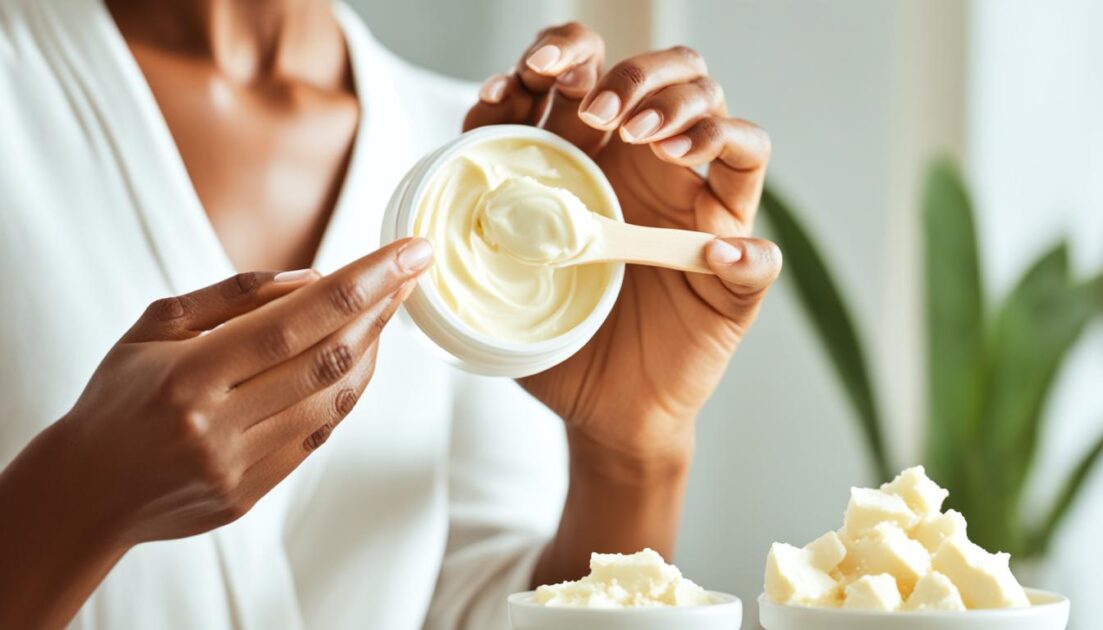I have discovered that shea butter is an incredible ingredient for skincare. Not only is it natural and versatile, but it also offers numerous benefits for the skin. Derived from shea tree nuts, shea butter is well-known for its moisturizing, anti-inflammatory, and healing properties. With its high concentration of fatty acids and vitamins, it is an ideal ingredient for softening and soothing the skin.
Shea butter has been proven to have anti-aging effects and can be beneficial for various skin conditions such as eczema and acne. Whether applied directly to the skin or incorporated into skincare products, shea butter can make a noticeable difference in the overall health and appearance of your skin.
However, it is important to note that individuals with acne-prone skin should use shea butter with caution as it may clog pores and potentially cause breakouts. While it may not be suitable for everyone, many people can enjoy the numerous advantages of incorporating shea butter into their skincare routine.
Key Takeaways:
- Shea butter is a versatile and beneficial ingredient for skincare.
- It moisturizes, soothes, and softens the skin.
- It has anti-inflammatory properties that can help with conditions like eczema and acne.
- Shea butter can be applied directly or incorporated into skincare products.
- Individuals with acne-prone skin should use shea butter with caution.
Benefits of Shea Butter for Your Face
Shea butter is an exceptional ingredient when it comes to taking care of your face. It offers numerous benefits that can help improve the overall health and appearance of your skin. Whether you have dry skin, acne, signs of aging, or sensitive skin, shea butter can be a valuable addition to your skincare routine.
Soothing Anti-Inflammatory Properties
One of the key benefits of shea butter for your face is its anti-inflammatory properties. It contains compounds that can reduce redness and swelling, providing a soothing effect on irritated or inflamed skin. Applying shea butter can help calm down skin conditions like rosacea or sunburn, leaving your face feeling more comfortable and balanced.
Moisturization for Dry Skin
Shea butter is a potent moisturizer that can deeply hydrate your skin and combat dryness effectively. It contains essential fatty acids that nourish and restore the skin’s natural barrier, preventing moisture loss. By using shea butter on your face, you can enjoy smoother, softer, and supple skin that is well-hydrated throughout the day.
Anti-Aging Properties
Though the exact mechanism is not fully understood, shea butter has been reported to have anti-aging properties. It is believed to promote the production of collagen, a protein responsible for maintaining the skin’s elasticity and firmness. Additionally, shea butter may help reduce the breakdown of collagen in the skin, minimizing the appearance of fine lines and wrinkles.
Gentle Care for Sensitive Skin
Shea butter is generally well-tolerated and is suitable for sensitive skin types. It has a low risk of causing allergic reactions and is known for its gentle nature. By incorporating shea butter into your skincare routine, you can provide your sensitive skin with a soothing and nourishing experience, promoting a healthier complexion.

“Shea butter is a versatile skincare ingredient that can improve the health and appearance of your face. Its anti-inflammatory properties calm redness and swelling, while its moisturizing effects alleviate dryness. Shea butter may have anti-aging benefits, and it is suitable for sensitive skin. Include this natural wonder in your skincare routine for a nourished and radiant complexion.” – Dr. Rachel Thompson, Dermatologist
How to Use Shea Butter on Your Face
There are several ways to incorporate shea butter into your skincare routine. One option is to purchase a cream or moisturizer that includes shea butter as one of the main ingredients. These products can be applied directly to the face before bed or in the morning. However, the fatty acids and oils in shea butter may make it difficult to apply makeup on top of it.
Another option is to create a homemade facial mask using shea butter and other ingredients like raw honey and grapeseed oil. This mask can be applied to the face for 10-12 minutes before rinsing off. It is important to note that shea butter may promote acne if you are prone to breakouts, so it should be used with caution.
I find that applying shea butter moisturizer at night works best for me. It allows the product to deeply penetrate and hydrate my skin while I sleep, leaving me with a refreshed and glowing complexion in the morning.
If you prefer a more targeted approach, you can also use shea butter as a spot treatment for dry or irritated areas of your face. Simply take a small amount of shea butter and gently massage it into the affected area.
Homemade Shea Butter Facial Mask Recipe
If you’re interested in trying a homemade shea butter facial mask, here’s a simple recipe to get you started:
| Ingredients: | Instructions: |
|---|---|
|
|
Remember to perform a patch test before using any new skincare product or homemade recipe, especially if you have sensitive skin or are prone to allergies. This will help you determine if you have any adverse reactions to the shea butter or other ingredients.
By incorporating shea butter into your skincare routine, you can experience its moisturizing and nourishing benefits for your face. Whether you choose to use a commercial shea butter cream or create your own homemade mask, be sure to listen to your skin’s needs and adjust accordingly for a healthy, radiant complexion.

Side Effects and Risks of Shea Butter
Shea butter is widely regarded as a safe topical ingredient for skin care. It is rare to experience allergic reactions to shea butter, even for individuals with tree nut allergies. The low allergenic potential of shea butter can be attributed to its minimal content of proteins that typically trigger allergies. As a result, many people can safely enjoy the benefits of shea butter without concerns about allergic reactions.
However, it is important to note that shea butter does have the potential to be comedogenic, meaning it can clog pores and contribute to acne breakouts. While some sources claim that shea butter is non-comedogenic, scientific evidence supporting this claim is limited. The American Academy of Dermatology suggests that shea butter can clog pores and lead to acne, especially for individuals with acne-prone skin. Therefore, it is crucial to exercise caution when using shea butter on the face, particularly if you are prone to breakouts.
Furthermore, when it comes to choosing shea butter for skin care, opting for organic varieties can provide additional benefits. Organic shea butter is produced without the use of synthetic chemicals, pesticides, or genetically modified organisms (GMOs), ensuring a purer and more natural product. By selecting organic shea butter, you can minimize your exposure to potential contaminants that could be present in non-organic alternatives.
Potential Side Effects and Risks of Shea Butter:
- Comedogenic (may clog pores and cause acne)
- Limited scientific evidence on non-comedogenic claims
With its moisturizing and soothing properties, shea butter can be a valuable addition to your skincare routine. However, it is essential to be aware of the potential side effects and risks associated with its use. By understanding these factors, you can make informed decisions about incorporating shea butter into your daily skincare regimen.
Comparison of Shea Butter Varieties
| Shea Butter Variety | Production Process | Benefits |
|---|---|---|
| Raw Shea Butter | Minimal processing; extracted from shea tree nuts without using chemicals |
|
| Refined Shea Butter | Subjected to refining processes, which can involve the use of chemicals |
|
When choosing shea butter for your skin, consider your specific needs and preferences. Raw shea butter preserves more of its natural goodness, making it a suitable choice for those seeking higher nutrient content. On the other hand, refined shea butter may be a better option for individuals with acne-prone or sensitive skin.

Choosing Shea Butter for Skin Care
When it comes to selecting shea butter for your skincare routine, there are a few important factors to consider. One of the key distinctions is between raw and refined shea butter. Raw shea butter is less processed and retains more essential nutrients, including cinnamic acid, which has anti-inflammatory properties and can offer additional benefits for the skin.
However, if you have acne-prone or sensitive skin, you may prefer to opt for refined shea butter. The refining process removes some of the potential impurities and reduces the risk of clogging pores. This can be particularly important for individuals who are prone to breakouts or have sensitive skin.
If you have specific skin conditions such as eczema, it’s crucial to carefully check the ingredients of any shea butter products you choose. Some additional ingredients or fragrances may aggravate eczema symptoms, so it’s important to choose products that are specifically formulated for sensitive or problematic skin.
In conclusion, shea butter can be a valuable addition to your skincare routine, providing moisturization, soothing effects, and potential anti-aging properties. Whether you opt for raw or refined shea butter will depend on your individual skin type and needs. By considering these factors and selecting the right shea butter product, you can harness the benefits of this natural ingredient for healthier, more radiant skin.
FAQ
What are the benefits of using shea butter for the skin?
Shea butter has moisturizing, anti-inflammatory, and healing properties. It contains high concentrations of fatty acids and vitamins, making it an ideal ingredient for softening and soothing the skin.
Can shea butter be used on the face?
Yes, shea butter can be used on the face. It has anti-inflammatory properties that can calm redness and swelling. Its emollient properties can moisturize and hydrate the skin, helping to alleviate dryness.
Does shea butter have anti-aging properties?
Shea butter has been reported to have anti-aging properties, although the exact mechanism is not well-known. It may promote collagen production and help reduce the breakdown of collagen in the skin.
Is shea butter suitable for sensitive skin?
Yes, shea butter is generally well-tolerated and has low risk of allergic reactions, making it suitable for sensitive skin.
How can shea butter be incorporated into a skincare routine?
Shea butter can be applied directly to the skin or incorporated into skincare products such as creams or moisturizers. It can also be used to create homemade facial masks.
Can shea butter cause acne?
While shea butter is generally considered low-risk, it can be comedogenic and may clog pores, potentially leading to acne breakouts, especially for individuals with acne-prone skin.
Is shea butter safe for individuals with tree nut allergies?
Yes, shea butter is usually well-tolerated even by individuals with tree nut allergies, as it contains little of the proteins that trigger allergies.
Is organic shea butter better for the skin?
Using organic shea butter can provide additional benefits and minimize exposure to potential contaminants.
Should I choose raw or refined shea butter for skincare?
Raw shea butter retains more essential nutrients, while refined shea butter is often preferred for individuals with acne-prone or sensitive skin, as it has less risk of clogging pores.
Can shea butter aggravate eczema symptoms?
It is important to check the ingredients of shea butter products if you have specific skin conditions such as eczema, as certain ingredients may aggravate symptoms.
What are the top benefits of shea butter for the skin?
Shea butter offers moisturization, soothing effects, and potential anti-aging properties, making it a valuable addition to your skincare routine.






